- Home
- Annette Blair
A Winter Heart, Sexy Amish Historical Novella
A Winter Heart, Sexy Amish Historical Novella Read online
A WINTER HEART, A Sensual Amish Historical Novella
A WINTER HEART originally appeared in a short novelette titled JONQUILS IN THE SNOW
In Ohio, Hannah Peachy has nurtured a winter heart since she lost her newborn daughter, husband, and twin sister, in a carriage accident that she caused. In Pennsylvania, Caleb Skylar struggles with the horror of his wife’s drowning, and his six-year-old daughter’s memory-induced nightmares. When Caleb aimlessly pulls up stakes and leaves his home behind, Anyah Peachy, the spirit of Hannah’s earthbound twin, leads him straight to Hannah. But how can two bruised souls, determined never to wound or be wounded again, accept love as a reward for their transgressions?
Review Quotes for Annette’s Sensual Amish Historicals:
“Annette Blair writes a wonderfully insightful Amish historical romance . . .” Harriet Klausner
“Annette Blair has a phenomenal writing talent. Readers will find themselves transported to another time and place . . . The author shows the pros and the cons of living an Amish life, as well as the need for faith in their Maker.” Detra Fitch, Huntress Reviews
“I've enjoyed Annette Blair's other books, especially her Rogues Club trilogy in her Regency Historicals, but for heroic, meaty fare, I strongly suggest you try her American Amish works . . . They aren't connected in any way other than by their settings and by their excellence.” Jane Bowers, RRT
A WINTER HEART
A Sensual Amish Historical Novella
by
Annette Blair
1873—Sugarcreek, Ohio
http://www.annetteblair.com
http://twitter.com/annetteblair
To find out when a new book is available, sign up for Annette’s mailing list at: https://www.facebook.com/annetteblairfans
Copyright:
Copyright 2012 by Annette Blair
Published by Annette Blair, August 1, 2012
E-book Cover Copyright 2012 Calista Taylor, www.calistataylor.com
Photoshop Brushes: Dark Garden Photography
All rights reserved.
This is a historical work of fiction. Names, characters, places, and incidents either are the product of the author's imagination or are used fictitiously, and any resemblance to actual persons, living or dead, events and establishments is entirely coincidental.
The scanning, uploading, and distributing of this book via the internet or via any other means, including those not yet invented, without the permission of the copyright owner, is illegal and punishable by law. Please purchase only authorized electronic editions, and do not participate in or encourage electronic piracy of copyrighted materials. Your support of the author's rights is appreciated.
Table of Contents
Note to Reader
Dedication
Chapter One
Chapter Two
Chapter Three
Chapter Four
Chapter Five
Chapter Six
Chapter Seven
Chapter Eight
Chapter Nine
Chapter Ten
Chapter Eleven
Chapter Twelve
Chapter Thirteen
Awards and Accolades: Amish Historicals
Excerpt: Jacob’s Return
Excerpt: Butterfly Garden
Annette Blair Bio
Annette Blair Booklist
Contact Annette
Note to Reader
I started writing romances before the Internet came into being—yes, when dinosaurs roamed the earth. I loved the Amish, researched them in Ohio and Pennsylvania back then, interviewed them, walked with them, was fortunate enough to have one teach me to drive a buggy. I also interviewed people who had left their Amish faith. I didn’t know about the Christian Romance Market, so I wrote Sensual Amish Historical Romances, where love between a man and a woman is expressed. Real stories about real people, who live, laugh and love. You just don’t get a dozen children without the love. I hope you enjoy reading my Amish stories as much as I enjoy writing them.
Special thanks to Kristen and Jessie, who hosted us at the Patchwork Quilt Country Inn, in Elkhart, Indiana. It became like a home away from home during our recent Amish research trip, where several new stories were born. Staying there was one of the nicest experiences of our journey, and we hope to return, again and again. Meanwhile, hugs to Kristen and Jessie . . . and to the Quilting Ladies.
Dedication
To Mom and her girls
Love to all three,
(Not counting me.)
Jeannette, Annette, Paulette, Liette;
A tongue-twister for Dad,
A laugh to be had.
Mom’s loss was a blow,
But she left us intact,
A noisy three-pack,
Like magpies and whirlwinds,
We live and we laugh,
As she smiles from above,
With our infinite love.
A WINTER HEART
by
Annette Blair
1873—Sugarcreek, Ohio
Chapter One
Amishman Caleb Skylar shifted his sleepy daughter in his arms and stepped from the empty house to the porch that ran full around it, wondering if the ghost who led him to this place would disturb his peace as much as the one he’d left behind.
His people did not believe in ghosts, and yet no footstep of hers marred the veneer of snow that covered Dovecrest Farm like a pall. Not a one could be seen between the imprint of his buggy wheels, though he had followed her, for no good reason, into the yard and down the drive.
A fine farm. She had led him to a farm and house for sale. Why, when that was exactly what he needed? How could she know?
Flanked by rich fields and lush pastures, it appeared as if its inhabitants had all passed reluctantly on, leaving their uneasy spirits behind.
He’d seen the sign on the house and knew fate took a hand: “Farm for Sale. Seek Hannah Peachy within.” But the house stood empty. “This seems as good a place as any to make a new start,” he said aloud, as if to prove that he was still alive. “What say you, Susiekins?”
“No.” Susie pouted and rubbed her big doe eyes to keep them from closing. “Mommie cannot watch over me from heaven if we hide on this faraway hill. She will not know where to find me.”
Caleb glanced beyond silver skies and clouds gravid with snow. “Naomi,” he said. If you are up there. “Our Susie lives two hundred miles to the west at the top of the rise.”
Yes, a good farm, though he supposed it would be better if a spirit had not led him here. The specter, an Amishwoman with wispy sunshine curls that dared escape her kapp and a dimpled smile that eased his troubled heart, had twirled in the farm’s drive on stopping, as if she’d come home. No sign of that in the snow, either.
Dancing was forbidden to their people, but in heaven, maybe not.
He’d packed up Susie for a quick escape one day, when it all got too much, the memories, bad ones, lingering where they lived, and he set aimlessly off until the spirit of a woman appeared, as if from nowhere, skipping in front of his buggy.
Allowing himself to be led by joy rather than sorrow for a change, Caleb found himself helpless to do anything but follow. Assuming she’d been sent by a higher power, he’d acted on blind faith. Hard to believe he had any left. And as his matched bays clip-clopped behind her, she reminded him of his need to live, not mourn, and to make Susie laugh again.
He sighed. “How can we buy this farm,” he muttered, “if no one is here to sell it to us?”
She appeared again, that joyful spirit, and she motioned for him to come. He followed once more, her walking backward, main
taining her distance, still without planting so much as a footstep to show for her guiding presence.
Caleb finally saw a woman across the narrow dirt road—a living, breathing woman, her back to him as she knelt in the grabhoff, the Amish graveyard, her black winter bonnet and shawl stark against the snow. “She must be freezing.”
The mourner drew him in a way he could no more explain than resist—in the way the specter had drawn him—and though Caleb hesitated, the specter indicated that he should proceed, hurry even, so he did.
Iced blades of grass crisped beneath his feet as he gave less thought to the specter’s reason for bringing him here than to his for doing her bidding. Desperate times, he supposed. Besides, the mourner might know where he could buy the abandoned farm.
Moving forward had become his only hope, for his sake as well as his daughter’s. There would be no going back for them to that place where Naomi’s life ended and Susie’s nightmares began.
A nudge on the graveyard’s wooden gate swung it fast and wide, the wail and clatter of it hitting the fence alerting the mourner to his presence. Kneeling in the middle of three headstones, she stiffened and raised her shoulders while lowering her head. Fear, he thought it was called.
Meanwhile, claiming the farthest of the three headstones by standing behind it, owning it, he thought, his specter waved him over. Engraved on the tablet: “Anyah Peachy, beloved sister, best friend.” She died at the age of twenty-three. She touched the stone and then her heart.
Hers, as he thought, and a deep sense of sorrow overtook him.
She indicated the middle stone. “Baby Grace Barkman, beloved daughter.” Grace left this earth the day she arrived, the same day Anyah died.
On the near gravestone: “Gideon Barkman, husband, father.” Same date of death, the word beloved markedly missing—a feeding frenzy for the gossips.
Caleb stopped close beside the trembling woman and waited patiently until she had no choice but to look up at him.
His heart raced when she did. He thought never to see another like his spirit guide. As ethereal up close as from a distance, her dimpled smile tugged at the cold hidden part of him. He fought the pull, shivered, and adjusted the quilt closer around Susie, finally asleep.
“How old is your little one?” she asked, her dulcet voice soothing as she turned to set another bulb in the frosty earth.
“Susie is six,” he said with forbidden pride.
“She must be heavy.”
“Ya,” Caleb said. “But I like the weight of her, especially her little head on my shoulder. Makes me feel safe.”
While Anyah faded, her twin sat back on her heels, assessing, nodding. “It is good that you know what you have. My little one sleeps here beneath the snow. I felt safe when I held her, too. But winter—it lives in my heart all the time now.” She patted the snow-cloaked earth, as if to make her little one more comfortable.
Caleb slipped his gaze back to the gravestones. Her babe died two years ago. Still, her pain must be as alive as the warmth of Susie’s breath on his neck.
Caleb started to speak but was forced to clear his throat first. “I do not think your Grace would want you to live so long in winter,” he said, reminding himself not to shun such wisdom. “Spring can be beautiful,” he added, meaning it for the first time in months.
“Winter has its own beauty,” she replied, and Caleb believed it, because this woman with a winter heart must be one of God’s most beautiful creations.
She turned to the grave on her left and began, again, to dig.
Gideon, Caleb saw, had been twenty-nine years old.
“Your husband?” Caleb asked, regretting the seemingly casual question the minute it passed his lips.
The woman’s jagged half-nod, her demeanor alert and strained, no longer revealed a serene acceptance. Guilt, he saw darken the gold of her eyes, raw and unbearable.
He knew it well. “I am sorry,” he said, as if she might understand the yoke of self-blame he regretted for both their sakes.
“A buggy accident,” she said, looking into a painful past, her deer-in-lantern-light expression proving that she did not understand his burden any more than her own. “It happened so fast,” she whispered. “Gideon died instantly. I was thrown and . . . Gracie was born, there, on the side of the road, nearly three months early.”
“Anyah?” he asked, his specter behind her, this time with a babe in her arms.
“Anyah was thrown, too, and badly hurt, but she crawled to me, helped me hold the babe, and after . . . after . . . Anyah promised that she and Gracie would walk together with God.”
Caleb cleared his throat and ignored the sheen that hazed his vision. “So you lost all three, your husband, your child, and your twin.”
“No, you are mistaken. I lost everything. Myself even.”
Chapter Two
The young widow stood and gazed beyond his shoulder toward the horizon. “I have yearned for two years to join Anyah and Grace.” The woman shrugged and regarded him with acceptance. “But I am still here.”
Acceptance, duty; they were everything in the Amish faith, or they were supposed to be, but Caleb had come to the rebellious conclusion that they were not enough. “I understand,” he said.
If not for Susie, he would still wonder why he should go on. Unable to say more because the knot in his throat and heart made words useless and impossible, Caleb shook his head in apology.
The woman understood; he saw it in her eyes. And she smiled, as if, inside him, she had seen something . . . worthy, and suddenly, all around him, a lingering darkness began to recede.
As grateful as he was shaken, Caleb experienced a heart-jolt, foreign and disorienting, as if the ground had just dropped from beneath him.
How odd that guilt and sorrow had driven him from home, and somewhere along his lost way, he’d entered this confusing, compelling realm of crystalline perception, where he and a stranger saw into each other’s souls.
The resultant face-warming discomfort was almost enough to make him want his understandable, if unstable, world back. Almost.
The widow seemed to agree, because with a swipe of her muddy hands down her white apron, she brought him back to reality with a jolt, the contrast as jarring as a black wool bonnet on snow . . . or flower bulbs in a frozen earth.
“Are you lost?” she asked, the mundane question further settling him. And for someone with a winter heart, her smile could surely bring the sun.
“My name is Caleb Skylar, Mrs. Barkman. I seek Hannah Peachy so I may purchase Dovecrest Farm.” Facing this woman, he felt . . . resurrected, God help him.
“I am Hannah Peachy.”
He checked her husband’s name.
“Yes, I went back to my maiden name. I like to keep the gossips busy. Come, I will show you the property. Would you like me to carry Susie for a bit?”
Surprised at her offer, Caleb stopped, and when he did, he caught in her expression a longing he suspected Hannah Peachy would want no one to see.
“I would not mind,” she said, pleading in her own way.
Caleb did not want to deny her, and yet— “It is just—Susie would scream if she woke in your arms. She is afraid of everyone except me.”
Shoulders lowering the barest measure, Hannah Peachy nodded and walked on, while reciting a litany of the farm’s good and bad points, from orchards, fields, farm equipment, to barn. “The daudyhaus is through the kitchen,” she said.
“I have no aging parents or in-laws to live there,” Caleb said, “but I suppose friends could stay there as they pass through town.”
“Anyah lived in ours.” Hannah’s smile grew wistful.
“I like the house,” Caleb said, stepping in behind her. “Susie and I took a tour when we first looked for you. Though it is bigger than a widower with one child needs—”
“I am offering it with furniture and linens, dishes and pans. Furnishing a place so large would be your biggest concern, and that is not necessary.”
&nbs
p; “I left everything of our old life behind, it is true,” he said, “and your banked-barn will be a luxury on a farm the size I can manage alone, but your thresher and manure-spreader sold me.”
He counted out two hundred dollars in cash, and Hannah accepted it, hands trembling, and tucked it into her apron pocket as if it could save her soul. And though she had already washed the mud off her hands, she swiped them down her apron, again, and looked at them as if they were finally clean. “I will be out in an hour,” she said, posture and expression relaxing as if she’d shed a great burden.
“I did not intend to put you out tonight,” Caleb said, confused by her eagerness. “Where will you go?”
Hannah led him around the house and pointed to the small house on the next property halfway between Dovecrest Farm and Dove Hollow. “There is my new house, ready to move in.”
“At twenty-five, you will live alone?”
She firmed her lips and raised her chin. “Yes. I can barely wait to move out,” she said. “I no longer wish to eat from the dishes our friends gave us with hopes for a long and happy life, or to sleep alone beneath my wedding quilt.”
Her last words came out wrong; they both knew it. Hannah firmed her lips, but the implication lingered. With anyone else, a tease would have been in order, but Caleb understood that Hannah mourned not so much a long wedded life as a happy one, and more than that, she mourned the loss of her babe, for which there were no words.
Blushing despite herself, he rather suspected, Hannah raised her chin. “I have to go now, Mr. Skylar.”
“We are neighbors,” he said. “I will call you Hannah and you will call me Caleb, please. And you will come to eat supper in the kitchen of my new house tonight? And maybe when you do, you can tell me where to find the pots and pans I need to cook Susie’s dinner? At noon, we ate the last of the provisions my Pennsylvania neighbors made for our journey. I am desperate.”

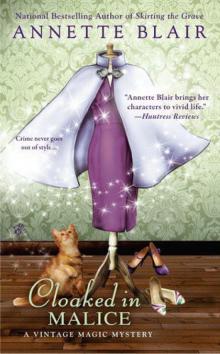 Cloaked in Malice
Cloaked in Malice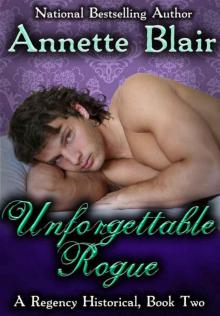 UNFORGETTABLE ROGUE (The Rogues Club, Book Two)
UNFORGETTABLE ROGUE (The Rogues Club, Book Two)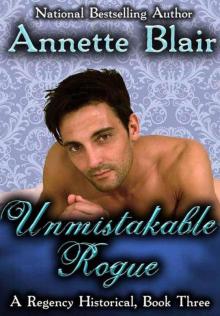 Unmistakable Rogue
Unmistakable Rogue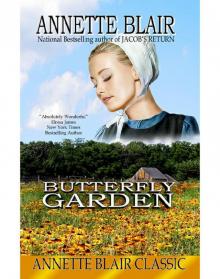 Butterfly Garden
Butterfly Garden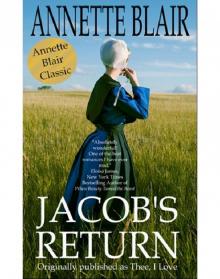 Jacob's Return
Jacob's Return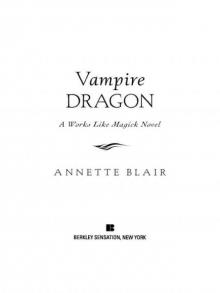 Vampire Dragon
Vampire Dragon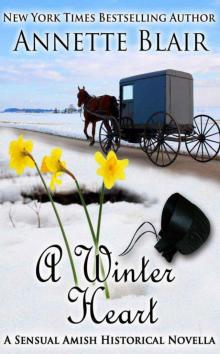 A Winter Heart, Sexy Amish Historical Novella
A Winter Heart, Sexy Amish Historical Novella Scandalous Brides
Scandalous Brides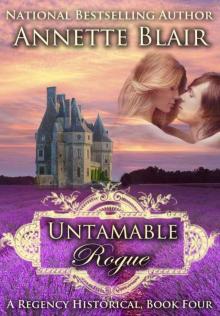 Untamable Rogue (Formerly: A Christmas Baby)
Untamable Rogue (Formerly: A Christmas Baby)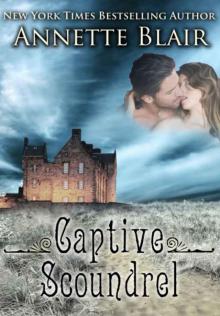 Captive Scoundrel
Captive Scoundrel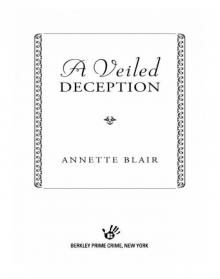 A Veiled Deception
A Veiled Deception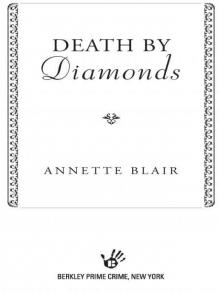 Death by Diamonds
Death by Diamonds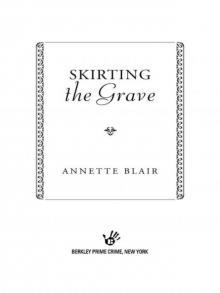 Skirting the Grave
Skirting the Grave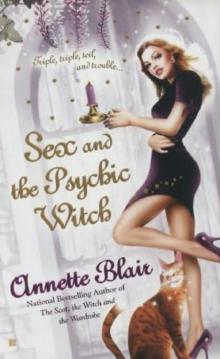 Sex and the Psychic Witch
Sex and the Psychic Witch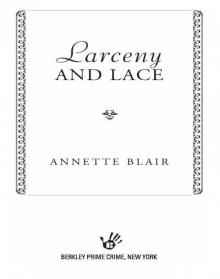 Larcency and Lace
Larcency and Lace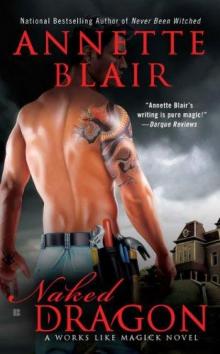 Naked Dragon
Naked Dragon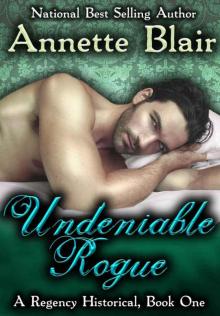 Undeniable Rogue (The Rogues Club Book One)
Undeniable Rogue (The Rogues Club Book One)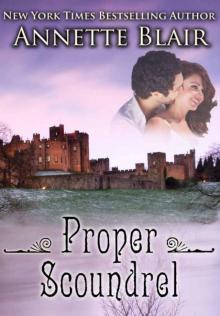 Proper Scoundrel
Proper Scoundrel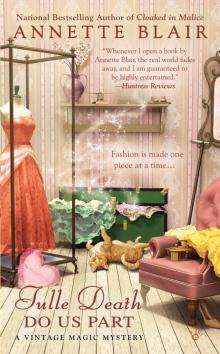 Tulle Death Do Us Part
Tulle Death Do Us Part